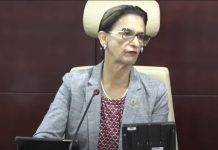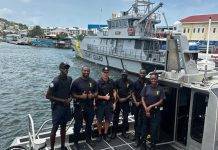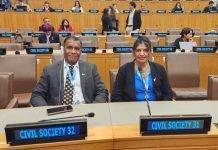Sub-regional and international authorities and experts debated about how to accelerate the recovery and strengthen economic resilience in the subregion during the 20th meeting of the Monitoring Committee of the Caribbean Development and Cooperation Committee, convened by ECLAC.
Authorities and representatives of 14 member states and 10 associate members from the Caribbean, along with five member states from Latin America, as well as specialists from sub-regional and international organizations and other experts attended the Twentieth meeting of the Monitoring Committee of the Caribbean Development and Cooperation Committee (CDCC), a subsidiary body of the Economic Commission for Latin America and the Caribbean (ECLAC), where they pointed up the strategies needed to support the post-pandemic recovery through greater regional solidarity and integration.
At the meeting, participants debated about the multidimensional challenges that Caribbean States continue to face and that define their vulnerability, and they discussed innovative solutions on financial, technological and institutional matters for accelerating the recovery and strengthening economic resilience in the subregion.
The event was inaugurated by Alicia Bárcena, Executive Secretary of ECLAC; Christian Guillermet-Fernández, Minister of Foreign Affairs and Worship a.i. of Costa Rica, in his capacity as representative of the country that currently holds ECLAC’s presidency; and Camillo Gonsalves, Minister of Finance, Economic Planning and Information Technology of Saint Vincent and the Grenadines, and Chair of the CDCC.
In various sessions, those attending the 20th meeting of the CDCC’s Monitoring Committee reviewed a preliminary working document presented by ECLAC under the title Reckoning with COVID-19: pursuing a people-centered recovery and more resilient future for the Caribbean; they addressed strategies to support the recovery through regional solidarity and integration, and how to safeguard the health of the Caribbean. They also reviewed a report on implementation of the 2020 programme of work for the Caribbean and defined the place and approximate date for the CDCC’s twenty-ninth session.
In her opening remarks, ECLAC’s Executive Secretary, Alicia Bárcena, indicated that this meeting offers the subregion’s countries the opportunity to reflect on the most pressing development issues. “ECLAC is fully committed to implementing the ‘Caribbean First’ strategy. We are doing everything we can to ensure that the Caribbean’s needs and interests have a prominent place in our work,” she stressed.
She added that the international community agrees that the threat of climate change to Small Island Developing States (SIDS) is unquestionable. “That is why some of the most resounding voices that have demanded moral and strategic leadership on climate action at the 26th Conference of the Parties to the United Nations Framework Convention on Climate Change (COP 26) come from the Caribbean,” she said.
Meanwhile, the Minister of Foreign Affairs and Worship a.i. of Costa Rica, Christian Guillermet-Fernández, reaffirmed the “Caribbean First” strategy promoted by ECLAC and indicated that his country has the strong conviction that through closer collaboration and greater integration in Latin America and the Caribbean, we will all be able to get ahead. His speech was viewed as particularly relevant since it was the first time that a Latin American country holding ECLAC’s pro tempore presidency participated in a meeting of the CDCC’s Monitoring Committee in a prominent way.
“We can only properly address the structural problems that have prevailed for a long time in our region, which have been aggravated by the pandemic and by the effects of climate change, through transformative social and economic solutions, based on the principles of solidarity and international cooperation, in their distinct modalities,” Costa Rica’s acting Foreign Minister emphasized.
In his remarks, the Minister of Finance, Economic Planning and Information Technology of Saint Vincent and the Grenadines, Camillo Gonsalves, called for not looking back in pursuit of a past status quo, but instead look forward, with history as a guide and not as a destination. “We must accelerate regional integration and not pause integration within the Caribbean region,” he declared.
“COVID-19 has been one of the worst economic times in the individual histories of the countries in the Caribbean region. Many of the tourism-dependent countries in the Caribbean have been economically battered in a way that is unprecedented, even without contemplating challenges related to debt and to the existential threats prompted by climate change and the impacts of disasters, such as this year with the eruption of the La Soufrière volcano in my country,” he stressed.
In her presentation of the document on the post-COVID-19 recovery in the Caribbean, Alicia Bárcena underscored that the Caribbean faces a triple crisis, unleashed by climate phenomena and aggravated by COVID-19, which causes growing economic and financial distress. “We are facing a protracted health disaster that reveals the structural inequalities of Latin America and the Caribbean,” she indicated.
With regard to non-communicable diseases (NCDs) – the topic of which was addressed in a special seminar held on Thursday, November 4 – she noted that the Caribbean is one of the subregions with the highest prevalence of NCDs and that the pandemic has strained health systems and exposed systemic limitations for managing public health emergencies such as pandemics.
She added that ECLAC’s projections point to the Caribbean growing 4.1% in 2021 and 7.8% in 2022. Employment and real household income will not return to pre-pandemic levels in the short or medium term, which will lead to lower standards of living for several years.
“We are observing ‘one crisis upon another crisis’ in the Caribbean. We urgently need a vulnerability index that would enable us to better understand the multidimensional nature of the problems that the subregion faces… To build a new future, the Caribbean needs to strengthen food security, promote economic diversification, strengthen disaster management, improve social protection, and bolster the health infrastructure to respond to COVID-19,” Bárcena explained.
“The pandemic can turn this crisis into an opportunity for aligning policies, with the aim of fulfilling the Sustainable Development Goals (SDGs), leaving no one behind. Cooperation and multilateralism for regional development, financing and debt relief, is the correct path,” she underlined.
The Executive Secretary’s presentation was commented upon by Ashni Singh, Minister of Finance of the Cooperative Republic of Guyana, who expressed satisfaction with the degree of attention ECLAC has given to the small States of the Caribbean and to the particular challenges they face. “We must have a conversation with the international community about affordable resources for building sustainable infrastructure,” he stated.
In later remarks made by Christian Guillermet-Fernández during a session on supporting the recovery through regional solidarity and integration, Costa Rica’s Minister of Foreign Affairs and Worship a.i. emphasized that innovative financing mechanisms such as the Caribbean Resilience Fund – proposed by ECLAC – and the inclusion of clauses on events such as pandemics and hurricanes as part of loan provisions, head in the right direction.
In addition, the Executive Director of the Caribbean Public Health Agency (CARPHA), Dr. Joy St. John, presented the conclusions of the seminar on non-communicable diseases that had been held a day earlier.
The Director of ECLAC’s Subregional Headquarters for the Caribbean, Diane Quarless, subsequently delivered a report on the 2020 programme of work for the Caribbean, detailing the subregional activities undertaken last year, which emphasized the response to the impact of COVID-19, in particular to further the design of ECLAC’s Caribbean Resilience Fund – which will be launched next year – with the aim of promoting the economic recovery and investment in adaptation and economic transformation, while also exploring measures to promote Caribbean States’ debt relief strategies.
At the close of the event, ECLAC’s Executive Secretary reinforced the notion that the CDCC is the quintessential intergovernmental body of the Caribbean, and indicated: “We will continue to push for productive diversification, for green and blue economies, to advance on finding financial solutions and move towards a vulnerability index to replace GDP per capita as a tool for measuring development, while also moving towards information technologies and sustainable transportation. And we will continue our efforts to collaborate with the Caribbean Community (CARICOM) and all the subregional organizations that are working in the Caribbean.”
Minister Camillo Gonsalves thanked all the delegates, participants and especially ECLAC for their work. “This has been a very productive meeting; we have a good programme of work in the coming year and I hope we can advance in the creation of a multidimensional vulnerability index for our region,” he stated.
At the conclusion of the meeting, delegates approved holding the 29th session of the Caribbean Development and Cooperation Committee (CDCC) in Suriname, following an alphabetical rotation scheme among member countries; they did not set a specific date beyond establishing that it will take place prior to ECLAC’s 39th session (to be held in 2022).
More information:
- Complete video of the event (English original).
- Working document: Reckoning with COVID-19: pursuing a people-centered recovery and more resilient future for the Caribbean.
- Twentieth meeting of the Monitoring Committee of the Caribbean Development and Cooperation Committee.
- Web page of the Caribbean Development and Cooperation Committee.





























